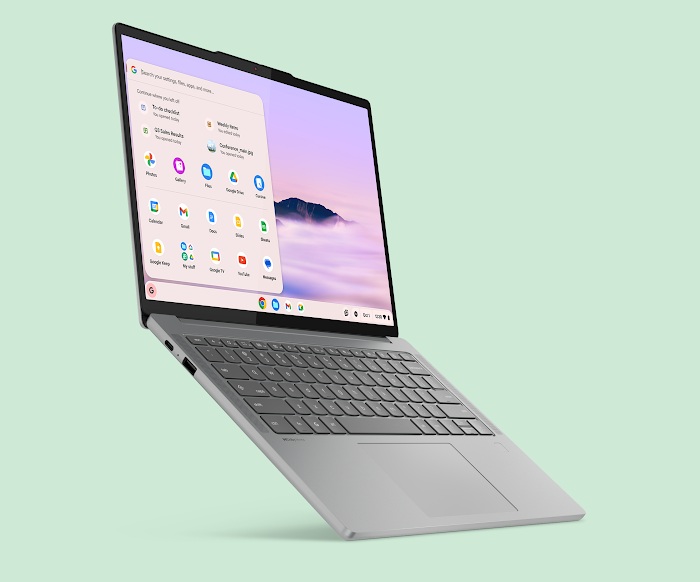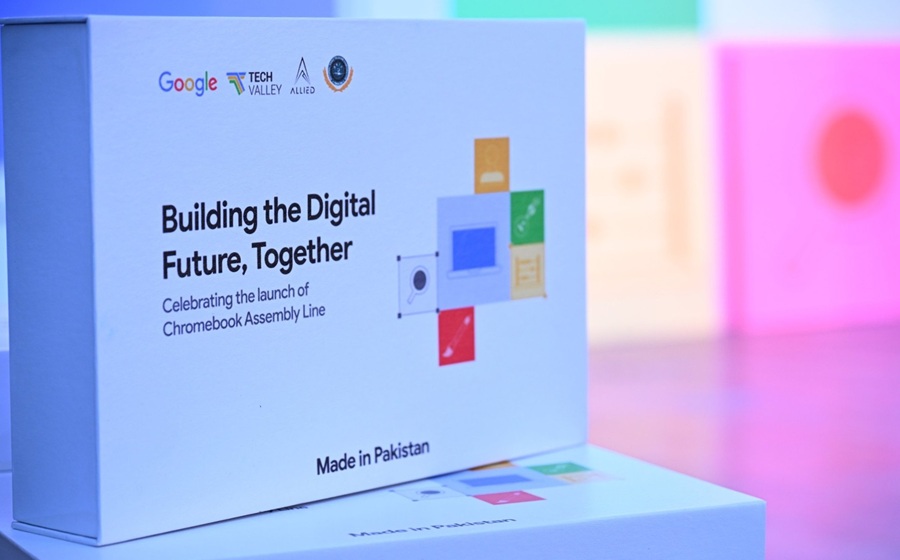For years, Pakistan’s role in the global tech economy centered on software exports and freelance services. Now, Google’s decision to assemble 600,000 Chromebooks a year at its new Haripur facility signals a shift from coding to creating.
The launch brings hardware manufacturing into Pakistan’s digital agenda, with the promise of new jobs, exports, and broader digital inclusion.
The initiative, unveiled at a ceremony in Islamabad on Nov. 4, marks the first time the tech giant will manufacture its laptops in Pakistan, signaling a broader push to localize production and expand digital access across the country.
Key Highlights
- The facility, located at the National Radio & Telecommunication Corporation (NRTC) in Haripur, aims to produce up to 500,000 to 600,000 Chromebooks annually by 2026.
- The assembly line has already created around 600 jobs, with production expansion expected to generate more employment and facilitate Chromebook exports.
- Google is completing its local registration and plans to open an office in Pakistan soon, which the government views as a strong endorsement of the country’s digital potential.
- A new MoU commits Google and Pakistan to train 100,000 developers, offer 100,000 Google Career Certificates, and establish AI labs in secondary schools.
- The locally assembled Chromebooks are intended to provide affordable, high-quality digital tools to bridge the digital divide, especially for the education sector.
Shifting from Software to Hardware
The launch of the assembly line is more than just a local business development; it represents Pakistan’s calculated shift from a primary focus on IT software and services to local hardware production. The partnership, which includes Google, the Ministry of Defence Production (MoDP), the National Radio & Telecommunication Corporation (NRTC), and local partner Tech Valley, establishes a domestic supply chain for modern education technology.
Deputy Prime Minister Ishaq Dar called the event a “historic milestone” and a “defining moment for our country’s digital transformation.” He emphasized the broader economic benefits, noting that localizing assembly “lays the foundation for jobs, supply chain, development and future tech exports.”
“Google’s decision to deepen its local presence in Pakistan is a moment of national pride and a strong endorsement of our country’s digital potential,” Deputy Prime Minister Ishaq Dar said. “This milestone strengthens Pakistan’s innovation ecosystem and boosts global investor confidence in our rapidly evolving technology landscape.”
Information Technology Minister Shaza Fatima Khawaja reinforced the focus on digital inclusion. She revealed that the IT Ministry has secured an MoU with Google for technology training, particularly for young women, with a specific focus on Artificial Intelligence (AI). Khawaja added, “We plan to open AI labs in Pakistan in collaboration with Google, especially targeting secondary schools to integrate AI education into the curriculum.” The provincial education authorities across Punjab, Sindh, Balochistan, and Khyber Pakhtunkhwa are actively supporting this vision.
Shaza Fatima Khawaja confirmed that Google has completed its registration in Pakistan and plans to open a local office. “Such high-tech ventures reflect global companies’ growing confidence in Pakistan’s economy while also promoting technology transfer, international best practices and new job opportunities,” she added.
New Era of AI & Digital Skills Training
Beyond the immediate manufacturing project, the collaboration extends deep into Pakistan’s future workforce and digital infrastructure. A strategic MoU outlines key initiatives to solidify the country’s position as a ‘Future-Forward, AI-Enabled Digital Nation.’
The commitment to training 100,000 developers and offering 100,000 Google Career Certificates will equip the country’s youth with credentials needed for the global tech job market. This training, which includes specialized programs for the gaming and startup industries, is also set to advance localized AI-powered solutions, such as Android services for public safety.
Farhan Qureshi, Google Pakistan Country Director, commented on the significance of this dual approach: “We’re excited to deepen our investments in people, skills, and innovation to help build an inclusive digital future for Pakistan in this AI-powered era.”

The government’s coordinated strategy to attract foreign investment through bodies like the Special Economic and Investment Facilitation Council (SIFC) is seen as a key factor in these major deals. Experts project that Pakistan’s growing digital ecosystem, bolstered by efforts like the new assembly line and Google’s local expansion, could add $6.6 billion (Rs1.8 trillion) in export value by 2030.
Economic and Strategic Implications
The project sits at the intersection of manufacturing, education and digital transformation. By localising Chromebook assembly, Pakistan is signalling that it is not just a software outsourcing destination, but increasingly a place for hardware production and tech-ecosystem expansion. The move has several key implications:
- Job creation and skills development: The facility’s initial workforce is around 600 young men and women, and the government anticipates scaling that number as production expands.
- Affordable access & digital inclusion: With Chromebooks being assembled locally, the expectation is lower cost and improved service/support for users, particularly in schools across Pakistan.
- Export potential: Though the initial focus is on the domestic market, government officials see the facility as a springboard to exports in the longer term.
- Boosting investor confidence: For global firms like Google to deepen their presence in Pakistan suggests growing confidence in regulatory environment and infrastructure. As Dar noted, the move carries “far-reaching implications for the digital economy, the innovation ecosystem and global investor confidence”.
Google’s entry into local Chromebook assembly and its scale target of around 600,000 units annually mark a meaningful shift for Pakistan’s technology sector. This story is not just about laptops, as it marks Pakistan’s shift from software exporter to emerging hardware producer, tying together manufacturing, digital access, and skills development in a broader push for technology-driven growth.
In the near term, local Chromebook assembly means more devices on school desks. In the medium term, it means Pakistan may be positioning itself as a regional hardware manufacturing hub if the ecosystem, investment and supply chains fall into place.








